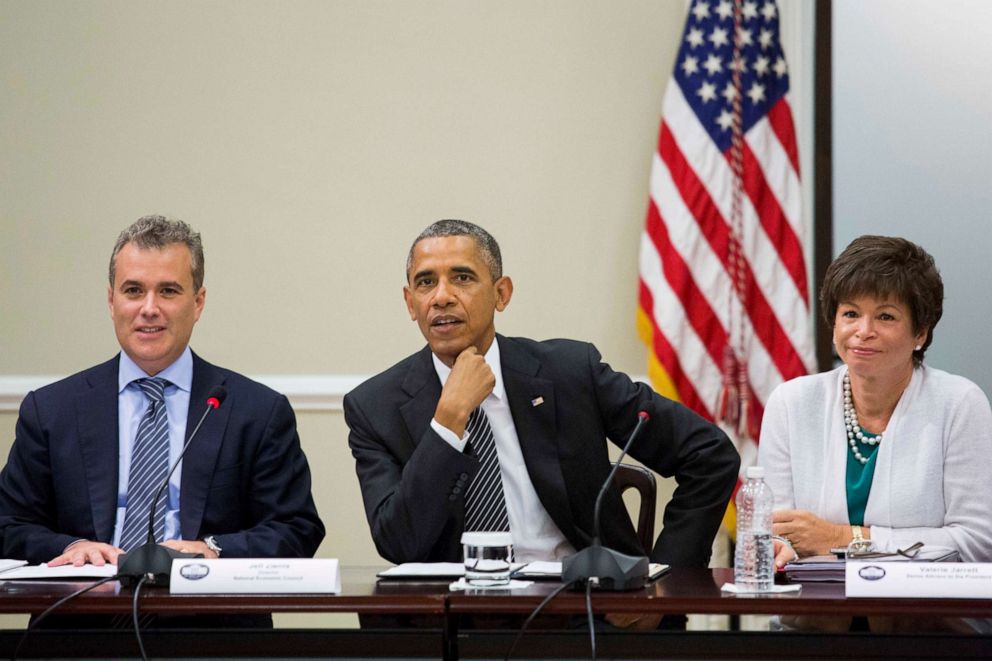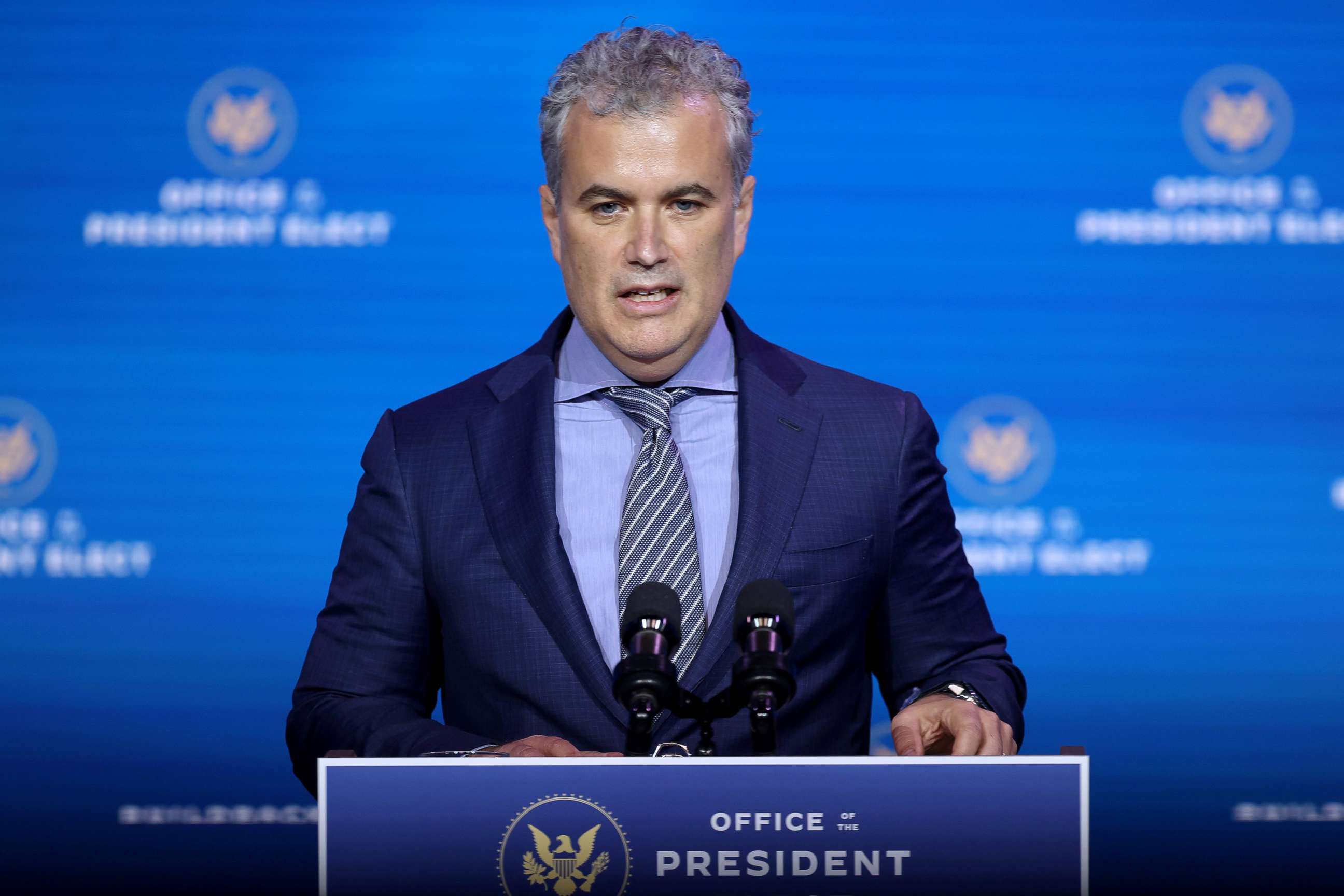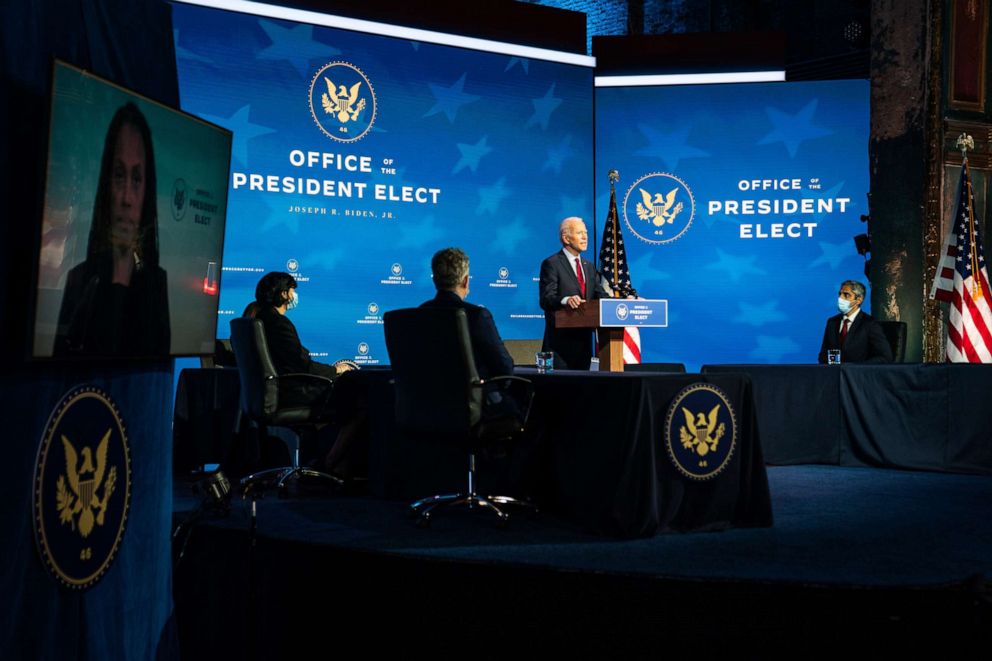Jeff Zients, Biden's COVID czar, inherits hardest job in administration
Zients is known in D.C. circles for his ability to navigate thick bureaucracies.
When Joe Biden takes over the presidency on Jan. 20, it won't be an infectious disease doctor or scientist leading his federal response to the COVID-19 pandemic. Instead, it will be Jeff Zients, a 53-year-old well-connected businessman known in Washington circles for his "Mr. Fix-It" ability to navigate thick bureaucracies.
As the nation enters the next coronavirus chapter, all eyes are on what Biden's team will do differently in a pandemic that's spun rapidly out of control. Biden's challenge -- which Zients will have to resolve with a team of other high-profile advisers -- will be to overhaul the Trump administration's system after a year of calling it a failure.
Zients and his wife, who co-founded the nonprofit Urban Alliance and serves as board chair, declined to be interviewed. But in interviews with people close to Zients, friends and colleagues described him as "the right guy for the job" and a relentless executor who's known for jumping onto sinking ships to try and right them.
For his part, Zients has publicly described his career as one spent obsessing over execution, keenly aware that delivering on big ideas is as important as developing them -- a critical awareness given the stumbling blocks currently hampering vaccine rollout.
"Big ideas do change the world -- but not on their own," Zients said in a 2018 commencement speech to business students at American University. "None of it matters unless you execute well, and executing well is really hard."

The logistical hurdles of ending the pandemic will undoubtedly be the largest challenge of his career, which Zients faces with no direct experience in public health. As a product of elite private schools with wealthy friends, his actions will be closely watched by advocacy groups who say the pandemic response must address decadeslong health disparities seen in Hispanic and Black communities.
So far, Zients' biggest political achievement has been reviving healthcare.gov after it failed on a national stage, threatening then-President Barack Obama's health care legacy. Over Obama's eight years in office, Zients also served as the first-ever chief performance officer, director of the National Economic Council and acting director of the Office of Management and Budget.
He came to be known for his well-worn "playbook": figuring out the problem, deciding on a plan, building a team with the most coveted talent and holding everyone accountable for results, according to interviews with friends and colleagues who have worked for him.
Zients repeatedly took the same approach, even on subjects he had "no direct experience in," during the Obama administration and it will be how Zients approaches coronavirus response, said Aneesh Chopra, Obama's chief technology officer during his first term.
Chopra, who has known Zients for over 20 years, worked closely with him when he was chief performance officer and the two were deemed the "IT SWAT team."
Chopra described Zients as someone with a "relentless focus on execution" who garners deep loyalty from his colleagues: "To put it bluntly, I'd run through a brick wall for Jeff," Chopra said. She said he will make up for not being a public health expert by knowing when to leave decisions to them.
But with a U.S. death toll over 390,000 as the world heads into its second year of the pandemic, Chopra acknowledged that this role would be far harder than revamping the failed Obamacare website.
Zients will coordinate the Biden administration's COVID-19 team to carry out the president-elect's plans to vaccinate 100 million people in 100 days, boost testing and get Americans to diligently wear masks -- lofty goals that will fall on Zients' shoulders.
But according to friends, Zients has been up against the wall before.
"He's the kind of guy who runs into the fire without drama," said former Human and Health Services Secretary Sylvia M. Burwell, who worked with Zients during the healthcare.gov debacle.

Recalling Zients' reaction to taking on that job, Winston Lord, a longtime friend, said Zients wasn't worried about being associated with the embarrassment if it didn't work.
"When President Obama asked him to take on healthcare.gov, it wasn't, 'Oh, what happens if it fails? What's gonna happen to my reputation?'" Lord said.
"And that's why he is perfectly suited for this daunting task," Lord added. Zients, who was the best man at Lord's wedding, also used to be his running partner, coaxing Lord to join him on his daily 5 a.m. runs.
Though he hasn't spoken to Zients about his day-to-day work under Biden, Lord speculated that Zients would be well equipped to lead a team through "unbelievable" stress.
"His empathy -- a willingness to treat everyone as an individual -- is just so critical for what we're about to go through," Lord said.
Burwell similarly vouched for the importance of having the right personality for the role.
"Jeff likes music. Jeff likes to dance," said Burwell, now the president of American University. "These are all things that I think are actually quite important as we think about who we're entrusting something that is so important right now to the nation and to each of us as individuals."
And by his own account, Zients isn't opposed to taking risks. He has described himself as ambitiously attracted to sinking ships over "rising stars."
"It feels great to hop on a rising star, to be part of something that's going really well. But it's the toughest situations that test your character, that force you to see what works, who steps up and what matters most," Zients said in his 2018 commencement speech at American.

He described many failed enterprises before he became CEO of the Advisory Board Company and Corporate Executive Board, two businesses he eventually took public that made him over $100 million, and the Cranemere Group, the investment company he co-founded after leaving the Obama administration which has nearly $1 billion in capital.
He's also credited as being one of the investors who brought the Washington Nationals to D.C. from Montreal and is a primary financier behind Call Your Mother Deli, a well-known local D.C. bagel joint that used Zients' kitchen for test runs.
His far-reaching business success was part of the allure for Obama, who said they had similar policy perspectives, but that "it sounded better" to CEOs when it came from Zients, a "rich, successful businessman" who could speak their language, rather than the president.
But those decades in the business world are exactly what rankled progressives when Zients was named COVID-19 czar -- particularly his two-year stint on the board of Facebook and his investments with the Cranemere Group.
Jeff Hauser, founder of the Revolving Door Project, a progressive watchdog group that scrutinizes administration appointees, said he's concerned Zients' business ties will put him more on the side of companies than people.
He also worries that Zients will personally profit after he leaves the position, which is assumed to be temporary, by making investments based on the "inside intel" he garners on the health care industry, Hauser said.
"The COVID-19 response is going to be something that is going to be judged by political actors in the short term and history in the long term. And if it is a vehicle for private profit, people will learn of it and they will remember it and it will forever tarnish his name," Hauser warned.
But even those criticisms are couched in the admission that Zients is "the relatively rare" example of a business person who can succeed in government, he said, noting Zients' attentiveness to organization and process.
"Most of the people brought in from business with those purported attributes fail in government," Hauser said, noting Zients has not failed. "And so he has that going for him."




